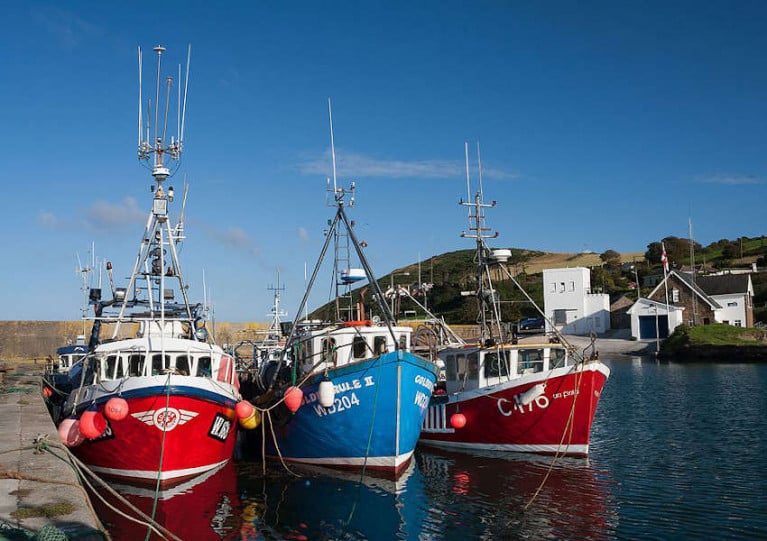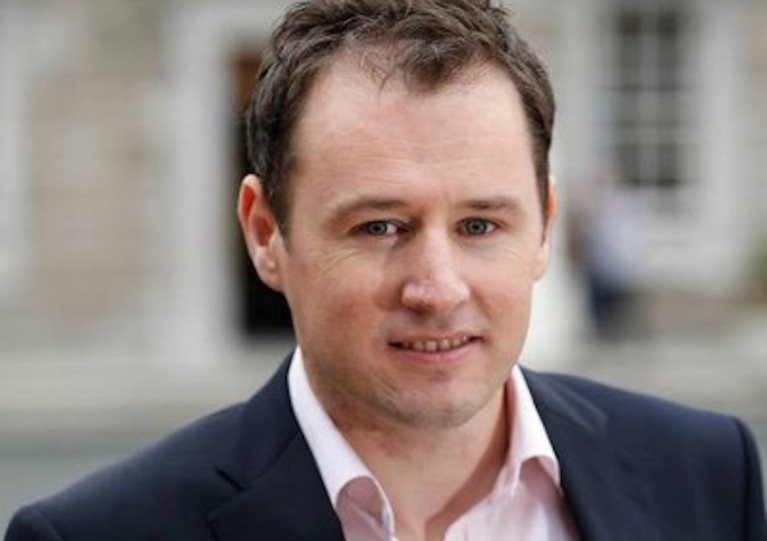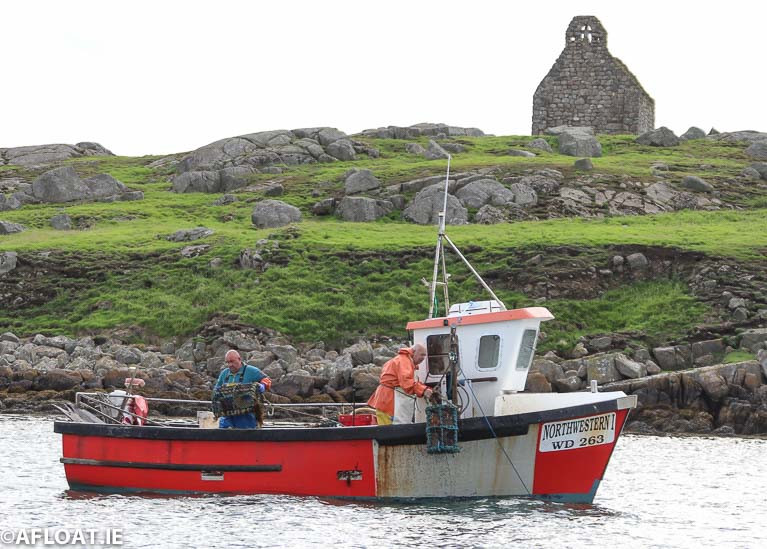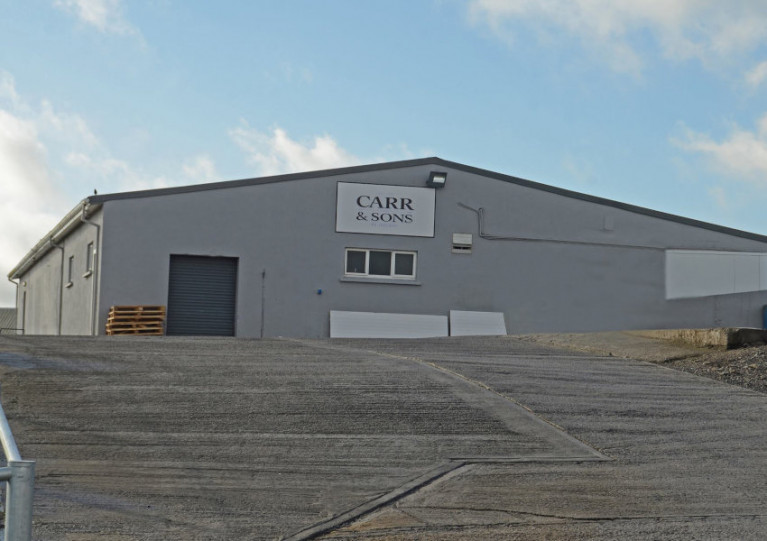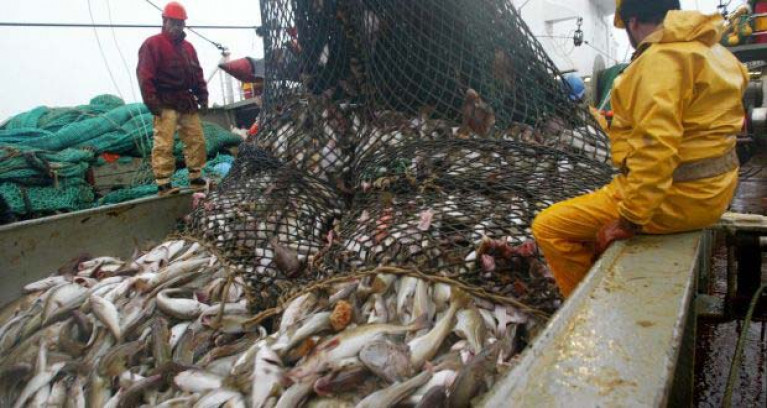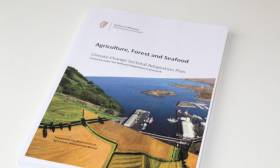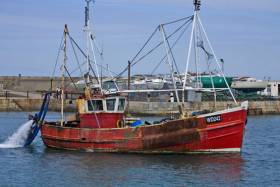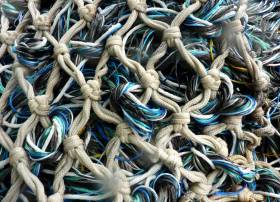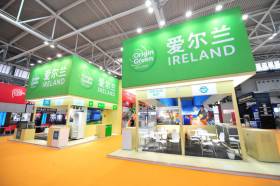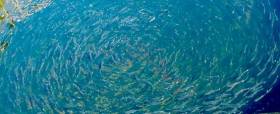Displaying items by tag: Seafood
Marine Minister Charlie McConalogue has announced the establishment of a Seafood Sector Taskforce, which has been charged with making recommendations on measures to mitigate the impact of upcoming fish quota share reductions.
As previously reported on Afloat.ie, the Irish fishing fleet faces a quota ‘payback’ that will see allowances for a number of key species, such as mackerel and prawns, slashed by thousands of tonnes — a significant shock to the industry and the coastal communities that depends on fisheries.
Speaking today, Friday 26 February, Minister McConalogue said: “These quota reductions will begin in 2021 and on a phased basis will result in a loss to Ireland of stocks worth €43 million per annum by 2026 or a 15% reduction overall in Irish fish quotas.
“The effects are immediate, with 60% of those reductions to take effect from April.
“The outcome of Brexit could have been much worse for the Irish Fishing industry in a no-deal scenario, with lack of access to UK waters for one third of our fish catches that occur in UK waters, or increased displacement of the Irish and other EU fleets into our waters.
“Nevertheless, the agreed EU/UK outcome will still have a significant impact for our fishing fleet and the coastal communities built around it.”
Former Bord Bia chief executive Aidan Cotter will chair the taskforce, which the minister has entrusted “to examine the impacts on our fishing fleet and coastal communities and report back to me with recommendations on how best to mitigate these”.
Cotter will be assisted by a steering group comprising Margaret Daly, deputy CEO of seafood processor Errigal Bay Ltd, and Mícheal Ó Cinnéide, former deputy CEO of the EPA, former director in the Marine Institute and presently on the board of the Aquaculture Licensing Appeals Board.
The taskforce’s interim report, due within two months, will focus on “recommended arrangements for a voluntary fleet tie-up scheme to temporarily counter the impact of the reduction in quotas, which will begin to occur from April,” the minister said.
Its final report is due within four months, and is expected to provide recommendations for a voluntary fleet decommissioning scheme, “to adjust and re-balance certain segments of the fleet with the reduced fishing opportunities available”.
The Taskforce has also been asked to consider and recommend “constructive actions” to deal with “the inequitable relative contribution of quota share by Ireland in the EU/UK Trade and Cooperation Agreement”.
Minister McConalogue also stated that the Government “is committed to providing financial supports to those most affected to help our seafood sector and coastal communities adjust to this blow”.
Invitations to participate in the Seafood Sector Taskforce have been issued to the following organisations:
- Killybegs Fishermen’s Organisation
- Irish Fish Producers Organisation
- Irish South & West Fishermen’s Organisation
- Irish South & East Fishermen’s Organisation
- Irish Islands Marine Resource Organisation PO
- National Inshore Fisheries Forum
- Fishermen’s Co-operatives (2 representatives of the 4 main Coops)
- Irish Fish Processors & Exporters Organisation
- Irish farmers Association (aquaculture branch)
- Fisheries Local Action Groups (1 representative of the 7 FLAGs)
- Department of Public Expenditure and Reform
- Department of Agriculture Food and the Marine
- Bord Iascaigh Mhara (secretariat)
- Enterprise Ireland
- Tourism Ireland
- Local Government Management Agency (two coastal local authority representatives)
- Údarás na Gaeltachta representative
Nine Seafood Processing Companies Get Investment Top-Up from EMFF Grants
Marine Minister Charlie McConalogue has announced €4.9 million in new investment by nine seafood processing companies, with his department’s European Maritime and Fisheries Fund (EMFF) programme providing over €1 million in grants.
Announcing the grants, Minister McConalogue said: “I am very pleased to support these nine seafood enterprises to further grow their business.
“These are particularly challenging times with both Covid and Brexit impacting on markets and the ongoing capital investment by our seafood sector is evidence of its resilience and its optimism for future growth prospects.”
The minister added: “My department’s European Maritime and Fisheries Fund programme has provided in excess of €230 million over the past seven years to support the sustainable growth of our seafood sector.
“A new Seafood Development Programme for the 2021-27 period is presently being drafted and I expect it to commence later this year.”
The €1,011,184 in grants are co-funded by the Government of Ireland and the European Union and are subject to terms and conditions.
Under the Seafood Processing Capital Investment Scheme, Good Fish Processing Ltd in Cork receives €42,228 towards information systems, for a total investment of €140,759.
Also in Cork, the Castletownbere Fishermens Co-operative Society has been granted €257,747 (total investment €859,157) for a spiral freezer, deheading machine and associated works.
And Senahoek Trading Ltd gets €448,364 (total investment €2,989,091) towards construction of a factory including cold store.
Howth, Co Dublin fishmongers Nicky’s Plaice Ltd will get €9,900 (total investment €41,000) towards an ice machine and pin boner, while Kerry Fish (Ire) Unlimited Company receives €185,775 (total investment €723,746) for reconfiguration of its ‘high care’ department and the purchase of an automated smoked salmon slicing line.
Elsewhere, Dundalk Bay Seafoods Ltd in Co Louth receives €19,410 (total €64,700) for investment in an efficient and environmentally friendly retail production line.
Under the Seafood Innovation & Business Planning Scheme, Goatsbridge Fish Processors Ltd in Kilkenny will receive €19,500 (total investment €39,000) for strategic advisory services enhancing financial planning and company structure in Ireland and the UK, while Sofrimar Unlimited Company in Wexford gets €28,260 (total investment €56,520) for trials and rental of equipment for converting waste products to powder for use in horticulture.
Bord Iascaigh Mhara National Seafood Survey Deadline Extended
Bord Iascaigh Mhara (BIM), Ireland’s Seafood Development Agency, has extended the deadline of its National Seafood Survey by two weeks in an effort to increase response rates. The survey is designed to highlight the importance of fishing to families and their wider communities in Ireland.
More than one in ten (14%) of Ireland’s 1400 under 10m inshore fishing vessel owners have already completed the survey. All remaining under 10-metre vessel owners now have an opportunity to complete the survey until Monday, 8 February 2021.
Vera O’Donovan, Regional Development Officer, BIM spoke of the importance of inshore fisheries to coastal communities in Ireland and said:
“There are many competing interests for the marine resource. It's vital that inshore fisheries can co-exist in the marine space and have their economic and social contribution to rural society acknowledged fully.”
Inclusion of under 10-metre vessel data will help to provide a more accurate account of the economic contribution that the inshore sector brings to coastal communities and to inform both National and EU policymakers.
A copy of the survey and a freepost envelope for its return was posted to every under ten-metre fisher in Ireland in December. The survey can also be completed online and emailed to [email protected]. For more details or to download a copy of the survey click here
Marine Minister Michael Creed has welcomed €3.5 million of new investment in six seafood processing companies.
Announcing the funding yesterday, Thursday 11 June, Minister Creed said: “In these very challenging times for business generally and notably our seafood sector, I am delighted to support these six companies in building for the future.
“With our own economy and European and world markets reopening, we can have optimism again for future prosperity and growth.”
Carr & Sons in Mayo receives more than €387,000 for an extension to modernise their processing facilities, while Sofrimar in Wexford gets over €562,000 for its automated processing and packing line plans, and Seafood Processors Ltd in Co Louth benefits from €370,000 towards white fish filleting processing technology.
Elsewhere, Good Fish Processing in Co Cork gets €396,000 towards packaging capacity and efficiency, Keohane Seafood also in Cork will improve factory flow, efficiency and sustainability with its €1.44m investment, and the West Cork Export Market Collective (comprising Union Hall Smoked Fish Ltd and Keohane Seafood) receives more than €353,000 for leveraging collaboration to boost export sales.
“These six companies are preparing their businesses to grow exports and value because they have the confidence to know that our seafood sector is a high growth sector and that it will resume its long-term growth pattern now that markets are getting over the recent temporary, albeit severe difficulties,” the minister said.
“The national strategy is to add value wherever possible to our seafood products to ensure those products are well placed in the market. These grants will assist these Irish seafood companies to deliver on that strategy.”
Minister Creed added that his departmets’s present EMFF programme “is ready to assist seafood companies get back to business with capital, innovation, marketing and other supports”.
“From next year, my department’s new EMFF programme for the 2021-27 period will commence and will play a major role in assisting the recovery and renewed growth of our seafood sector,” he said.
Grants of €1,081,192 from the European Maritime and Fisheries Fund (EMFF) programme make up a portion of the total investment. These grants are co-funded by the Government of Ireland and the European Union and are subject to terms and conditions.
Seafood Development Programme 2021-27 Public Consultation Launched
The Minister for Agriculture Food and the Marine, Michael Creed TD today announced the opening of an initial public consultation to inform the development of a new operational programme for the sustainable development of the seafood sector for the 2021-27 period. The Programme will be developed in the context of the proposed EU Regulation on a European Maritime, Fisheries and Aquaculture Fund, which is presently being negotiated by the EU co-legislators with a view to enactment in the Autumn of 2020. The new operational programme will be co-funded by the Government of Ireland and the European Union.
Speaking at the launch of the public consultation, Minister Creed said: “My Department’s present EMFF Operational Programme for the seafood sector is nearing its end and will be wound up in 2021. It has been a success in channelling €240 million into vital investments to promote the sustainable growth of our seafood sector and will leave a lasting legacy of enhanced sustainability, profitability, competitiveness and enhanced value.
We are now facing into a new Programme period starting in 2021 and while many of the challenges and opportunities facing our seafood sector will continue to be relevant for the future programme, there will also undoubtedly be some new and changed investment priorities. Adapting our seafood sector to the changed landscape that Brexit will bring will be a vital consideration. Climate change is a top priority for Government and we must consider what the new Programme will contribute to Ireland’s response. Preservation of marine biodiversity and Clean Oceans and ensuring the sustainability of our fish stocks will continue to be top priorities. And we must continue to enhance the competitiveness, value and productivity of our sector through innovation, training, and targeted capital investment.
In this initial public consultation, I am asking our stakeholders to share their views on how we should address these and other relevant issues in our new programme, in what ways we should intervene, and how should we prioritise and get the right balance in distributing the available funds”.
The open call for submissions will run until 5 pm on Friday 7 February 2020. See the survey here.
Government Approves Agriculture, Forest & Seafood Climate Change Sectoral Adaptation Plan
Marine Minister Michael Creed, yesterday (Thursday 31 October) welcomed Government approval for the Agriculture, Forest and Seafood Climate Change Sectoral Adaptation Plan to prepare for the impacts of climate disruption.
“I am very pleased the Agriculture, Forest and Seafood Climate Change Sectoral Adaptation Plan has been approved as part of the Whole-of-Government approach adopted under Climate Action Plan 2019,” he said.
“We have taken a consistent approach to adaptation planning across the Department [of Agriculture, Food and the Marine] and have prepared a single plan covering the agriculture, forest and seafood sector.”
Th minister added: “In addition to reducing our emissions, we must ensure that our food production system is resilient and ready to adapt to future climate risk.”
Minister Creed described the plan approved today as “an important next step in our goal to build a strong and resilient sector that is well placed to take on the challenges and opportunities presented by our changing climate”.
The Adaptation Plan highlights a number of case studies identifying how the sector has and will continue to be impacted by changing weather patterns and steps towards building resilience.
The plan and its associated documents are available on the DAFM website HERE.
Marine Minister Michael Creed yesterday (Thursday 27 June) helped launch the public consultation process on the draft Climate Change Adaptation Plan for the agriculture, forest and seafood sectors.
“I am very pleased to launch this public consultation on adaptation planning,” said Minister Creed. “We have very much taken a joined-up approach to adaptation planning across the Department [of Agriculture, Food and the Marine] and have prepared a single plan covering the agriculture, forest and seafood sector.”
He added that in addition to reducing our emissions, “we need to ensure that our food production system is resilient and ready to adapt to future climate risk.
“Farmers, landowners and fishermen are very much to the forefront of dealing with the impacts of a changing climate in their everyday activities. However, climate change is not just an issue for the primary producer; it is something that everyone in the production chain needs to consider.
“The Irish agriculture, forest and seafood sector will not only be impacted by changes in climate here at home, but also by climate change globally.”
Andrew Doyle, Minister of State for food, forestry and horticulture, said the plan is “a next step in climate action planning. To successfully deal with the challenges facing us, we need to work together to make the right choices. While there will be challenges, there will also be opportunities.”
The draft Climate Change Adaptation Plan highlights a number of case studies identifying how the sector has and will continue to be impacted by changing weather patterns, and steps towards building resilience.
Feedback on the draft plan and suggestions as to how the department and the sector itself can best prepare to operate in a changing climate should be forwarded before the closing date of Friday 16 August.
Speaking ahead of the Our Ocean Wealth Summit in Cork earlier this month, Tánaiste Simon Coveney said the State is particularly aware of the threat posed by climate change to this island nation.
The subsequently launched Climate Action Plan from the Department of Communications, Climate Action and the Environment has been welcomed in many quarters, but has also been criticised for showing “little ambition”.
Trade in fish from the EU to Britain will be subject to a range of tariffs in the event of a no-deal Brexit.
But there will be zero tariffs for goods traded from the Republic to Northern Ireland under the temporary measures announced by the UK government this morning (Wednesday 13 March).
It follows the Commons defeat of Theresa May’s latest tabling of her Withdrawal Agreement deal, with MPs set to vote tonight on whether to rule out the no-deal Brexit option.
It is now proposed that should Britain leave the EU without a deal, no new customs checks or controls would be introduced on the border between the Republic and Northern Ireland.
However, tariffs would still apply on goods moving from the EU into the rest of Britain via Northern Ireland.
The new regime zero-rates tariffs across many imports into Britain after a no-deal Brexit. But agri-food products are among the listed exceptions, with a range of rates applying.
Fish and seafood will be subject to a range of import tariffs from 7.5% for frozen monkfish meat (excluding fillets) to 24% for prepared or preserved tuna (excluding bluefin).
A rate of 12% will apply to frozen crustaceans, while frozen fish will be hit with 8% charges, with fillets levied an extra percent.
The Irish Farmers’ Association has already branded the proposals as disastrous for Ireland’s agricultural industry, singling out beef as one of is “most exposed sectors”, as RTÉ News reports.
Irish Seafood To Make An Impression At Major Trade Expo In China
Later this week Andrew Doyle, Minister of State at the Department of Agriculture, Food and the Marine, will lead Irish participation in Qingdao, China at the Seafood Expo, one of the largest seafood fairs in the world.
Irish seafood exports to China have grown rapidly to over €28 million last year, and there is potential for further growth. Up to 12 Irish seafood companies will be represented on the Origin Green Ireland stand.
This trade visit follows technical meetings to discuss meat market access held by DAFM officials in Beijing on Friday, and the Trade Mission to Indonesia and Malaysia led by Marine Minister Michael Creed, who also addressed the Our Ocean Conference in Bali last Monday.
“Market development, including understanding, accessing and growing new markets, is a key theme of our shared Food Wise 2025 strategy, and an important response to the challenges posed by Brexit,” Minster Doyle said.
Earlier in the week the minister will attend the CIIE (Chinese Import and Export Expo) in Shanghai. This Chinese government-led expo, to be opened by President Xi Jinping, is intended to serve as a showcase for China’s commitment to international trade.
The Irish delegation will be led by Heather Humphreys, Minister for Business, Enterprise and Innovation and will feature a significant presence from Bord Bia and a total of 11 Irish meat and dairy companies.
More Than €1.5 Million In Grants For 20 Seafood Companies
#Seafood - Marine Minister Michael Creed has announced more than €1.5 million in grants to 20 seafood enterprises in 10 different counties around Ireland.
The grant awards — under the European Maritime and Fisheries Fund (EMFF) Operational Programme for the seafood sector ad totalling €1,532,230 — will support total investment of €4,018,852 in the fisheries, aquaculture and seafood processing sectors.
These grants are co-funded by Government of Ireland and the European Union and subject to terms and conditions.
“It is very encouraging to see a continued increase in investment in aquaculture and these investments will positively contribute to our sustainable growth targets for the sector,” Minister Creed said on launching the latest grants. “ It is also reassuring to see our fisheries cooperatives continuing to invest to position themselves to handle unwanted catches under the new CFP discards ban.
“Investing in our seafood sector increases jobs in rural and coastal communities – a priority for this Government. Furthermore the development of the innovation and value added capacity of the sector is key to mitigating the potential impacts of Brexit.”
The news comes just days after Minister Creed announced €1.5 million in funding for more than 100 coastal-based projects under the EMFF, as previously reported on Afloat.ie.


























